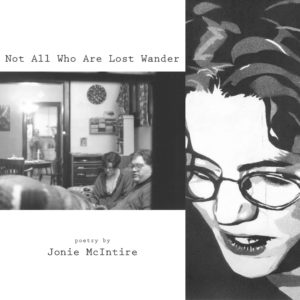SLEEPWALKER by Linda K. Sienkiewicz
$15.99
Sleepwalker is a moving poetic tribute to Linda Sienkiewicz’s late son, Derek. Resolute, lyrical, and unflinching, these poems are informed by profound loss even as they pulse with a mother’s capacious love. A brilliant and devastating account of parenthood as the junction where both our greatest gifts and our greatest fears sometimes converge.
–Kelly Fordon, author of I Have the Answer and Garden for the Blind (Wayne State University Press) and Goodbye Toothless House (Kattywompus Press)
Only a poet as brave as Linda Sienkiewicz can invert grief’s long shadow into a beam that shines between worlds, illuminating the faces and voices of the lost. Reading her Sleepwalker, we’re nudged awake from the dream and reminded: hold close those you love, cherish the life you’re in. By their light, these poems salvage and reclaim the heart and its losses. And for that—for the work of this brave poet—I’m grateful.
–Robert Fanning, author of Severance, Our Sudden Museum, American Prophet, and The Seed Thieves
In Sleepwalker, Linda Sienkiewicz writes with tenderness, clarity, and breathtaking vulnerability about her eldest son, who took his own life. In beautiful, intensely felt poems, she captures her spiraling thoughts, anger, and waves of grief. Throughout the book, her desire for connection endures: in one poem, she hears her son in a cello’s “sad unhurried depths;” in another, her son reappears in her kitchen ten years later, ready to listen to everything she never said to him. I admire these poems deeply. I wish they did not have to be written.
–Kathleen McGookey, author of Instructions for My Imposter
Description
SLEEPWALKER
by Linda K. Sienkiewicz
$15.99, paper
979-8-88838-223-3
2023
Linda K. Sienkiewicz‘s poems speak with intense fierceness to hard-earned compassion and painful healing after her eldest son’s suicide. Trying to make sense of tragedy, she unearths the heartbreak of motherhood and deep loss, revealing tender, resilient love in poems that embrace who her son was and what he will never be.Readers who have suffered such a loss will know they are not alone.
Linda K. Sienkiewicz has founded an adult ADD support group, taught calligraphy, conducted journal writing workshops at a domestic violence shelter, given poetry workshops, worked as a graphic artist and a conservation picture framing specialist, and participated in Pet-a-Pet therapy with her chocolate Lab. She currently volunteers at Neighborhood House, a local nonprofit. She attended Cooper School of Art in Cleveland as a scholarship student, and holds an M.F.A. from the University of Southern Maine. Widely published, she lives with her husband and two incorrigible corgis in southeast Michigan.






Lauren M Davis (verified owner) –
Linda K. Sienkiewicz’s poetry collection Sleepwalker is full of dagger-to-the-heart poems about her late son who is depicted as a navy man but more-so as her beautiful first-born child. Poems about the great pains of grief appear alongside poems that celebrate her son’s life shared with hers. Some poems explore what Sienkiewicz’s son left behind while other poems share what he brings to her in his afterlife form. Sleepwalker teaches one how to grieve with both courage and grace. It asks for peace and cries out, rightfully remembering the adored.
Rick Bailey (verified owner) –
I woke up this morning thinking about Sleepwalker, Linda K. Sienkiewicz’s book of poems, considering what to say about it, wondering how to find the words sufficiently to honor it. This is a book about grief, about the unthinkable loss of a child who takes his life, about how to live with that. I had just finished reading a book about homes blown to smithereens by a hurricane. Lying in bed I pictured a house, her home, flying into the air, spinning about and coming apart, forgetting that was the image on the cover of her book. With each poem in this book, she drives a stake into the ground, holding the house in place, keeping it from flying apart.
There is heartbreak throughout, the chaos of emotion intricately presented. In a poem about shipwreck (“What Every Mother Hopes For”) a boy miraculously survives and comes home. In another poem, in an orgy of anger (“Gone: A Dream”) the boy leaves home, the mother watching from a second story window, wanting to protect him, to help him, “I want to jump from the window after him / but I’m tangled in the curtains.” Helplessness pervades the collection. In the title poem, “Sleepwalker,” the mother connects–”every night I give him a kiss / to wear on a chain around his neck”–while realizing the separation, a gulf she cannot cross–”I am on the other side of his journey.”
And the discovery, in “The Second Worst Thing,” rendered in agonizing minimal detail:
The police took
your laptop
I don’t know what else
and then
you
Along with heartbreak (a thud deep in a mother’s womb, as Sienkiewicz describes it), there is the endless return and re-examination, and there is no answer, no reply. There is only continuation. “Once you let go, the body takes over,” she writes. Nothing matters, and tomorrow comes too soon.
Love is an ache. In these marvelous poems, the reader aches with her.
Kim Fairley (verified owner) –
Sleepwalker by Linda K. Sienkiewicz is a book of poems that left me breathless. Her images are so heartbreakingly vivid that I had to pause after most of them, just to take them all in. A brave, unflinching portrait of motherhood and loss that when you finish, I guarantee you will hug close to your heart.
Cheri C (verified owner) –
Sleepwalker captures a mothers experience of the world once she has lost her son to a tragic death. Family photos and events herald questions of “what happened after” as she searches for meaning, almost like clues as to the nearly unspeakable loss she has suffered. Why did this happen? Where is he now? As the title poem Sleepwalker suggests, perhaps walking “in another place, a different time/turning invisible pages. We are placed on the other side with the author, asking if our pages are the invisible ones. In From Our House to Your House, the collective grief of a nation is arrow-headed into the personal, and the ways in which we desperately hope for better, and try not to look at the chaos and pain, though we can’t miss it, how grief connects to grief. Linda creates capsules of a mother’s regrets, pain, and sorrow that we also cannot look away from. She does not flinch in those “What could I have done better? What did I do to make it worse?” moments. The book begins with a poem from her son himself, Moon and No Stars, and in it he says, “A moon with no stars is no moon at all”. As you read this book, you will follow the author’s journey in processing a world in which the stars around her moon have suddenly gone out. Read this book slowly, and carefully with an open heart, which is clearly the way in which it was written.